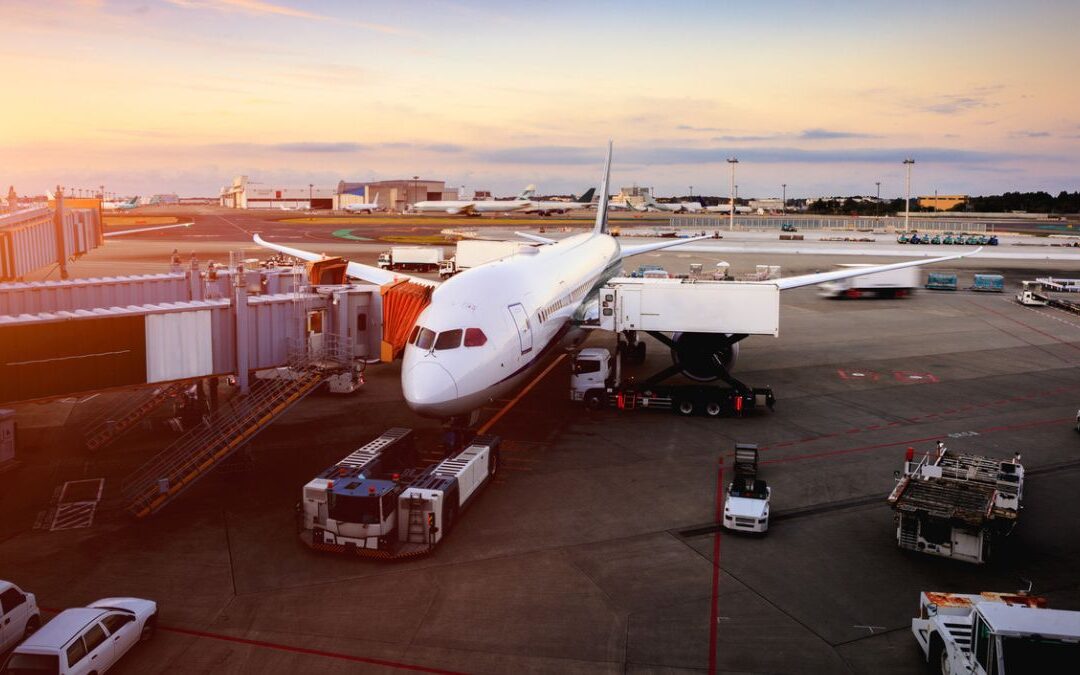What is air freight?
As the name suggests, air freight involves the movement of goods by air. It encompasses both domestic and international transport, with goods either travelling on passenger planes or dedicated cargo aircraft. The speed and security that air freight provides make it ideal for urgent or high-value shipments.
How air freight works
Air freight services operate through a network of airlines, airports and freight forwarders. To transport goods, businesses often partner with an air cargo freight forwarder, who acts as an intermediary, coordinating the entire process from pick-up to delivery. These forwarders manage the logistics, ensuring compliance with international regulations, handling customs clearance and booking cargo space on flights.
The cargo then undergoes security checks and is loaded onto the aircraft. After the plane lands, the cargo is offloaded, cleared through customs and delivered to its final destination. The entire process is designed for speed and efficiency, ensuring that goods reach their destination as quickly as possible.
What is the difference between air freight and air cargo
While both terms are often used interchangeably, air freight typically refers to larger, commercial shipments that involve contracts between businesses and freight forwarders. In contrast, air cargo can refer to any goods being transported by air, including smaller packages or personal deliveries handled by courier services.
Businesses generally opt for air freight when they need to move large volumes of goods, while air cargo may be used by individuals or small companies for less complex shipments. However, both methods provide the same primary benefit: fast and efficient transportation.
How to calculate air freight cost
While air freight is faster, it is often more expensive than other delivery methods, so understanding the cost structure is crucial.
Costs are typically based on either the actual weight or the volumetric weight of the cargo, whichever is higher. Volumetric weight is calculated by multiplying the length, width and height of the cargo and dividing by a specific factor. The formula ensures that bulky but lightweight items are charged based on the space they take up, not just their weight.
In addition to the weight, other factors influencing the cost include:
- Distance: longer distances generally result in higher costs.
- Urgency: expedited shipments can carry premium rates.
- Customs fees: duties, taxes and other regulatory fees can add to the total cost.
- Fuel surcharges: fluctuations in fuel prices may impact rates.
Air freight advantages and disadvantages
Despite its benefits, air freight also has its drawbacks. Below is a comparison of the key advantages and disadvantages.
Advantages:
- High security: airports and airlines have strict security measures to protect goods.
- Reliability: with scheduled flights, businesses can plan more accurately for deliveries.
- Global reach: air freight services provide access to remote or hard-to-reach locations.
- Speed: air freight is the fastest mode of transport.
Disadvantages:
- Cost: air freight is more expensive compared to sea freight or land transport.
- Environmental impact: aircraft produce more CO2 emissions compared to other transport modes. But efforts are being made to reduce emissions.
- Size and weight limitations: certain large or heavy items may not be suitable for air transport.
Why opt for air freight services?
There are several reasons businesses opt for air freight over other methods of transportation. Speed is perhaps the most important factor, especially for industries dealing with perishable goods or high-demand products. Additionally, the global reach of air freight services allows businesses to access markets in distant locations that might not be easily served by sea freight or road transport.
Other reasons to choose air freight include:
- Efficiency: air freight cuts down delivery times, ensuring goods reach customers faster.
- Flexibility: airlines operate frequently, providing multiple options for urgent shipments.
- Competitive edge: faster delivery times can give businesses an advantage in competitive markets.
How to choose an air cargo freight forwarder
Selecting the right air cargo freight forwarder can make a significant difference in how smoothly your shipment is handled. A reliable forwarder will manage every aspect of the delivery process, from documentation to customs clearance, ensuring your goods reach their destination on time and in perfect condition.
When choosing a freight forwarder, consider the following factors:
- Experience: look for a forwarder with extensive experience in air freight logistics.
- Network: a broad global network can ensure more efficient handling of international shipments.
- Service range: ensure the forwarder offers the type of air freight service you need, such as customs clearance or door-to-door delivery.
For businesses seeking to optimise their logistics and reduce delivery times, partnering with an experienced air freight provider is essential. To learn more about air freight services and how they can benefit your business, visit Uniserve’s Air Freight Services.
Conclusion
Air freight has revolutionised global trade, offering a reliable and efficient solution for businesses looking to move goods quickly across borders. Whether it’s high-value electronics or time-sensitive pharmaceuticals, air freight services ensure that products reach their destination on time and in optimal condition.
However, while speed and security are the standout benefits, the costs and environmental impact should be carefully weighed when deciding whether air freight is the best option for your business.

